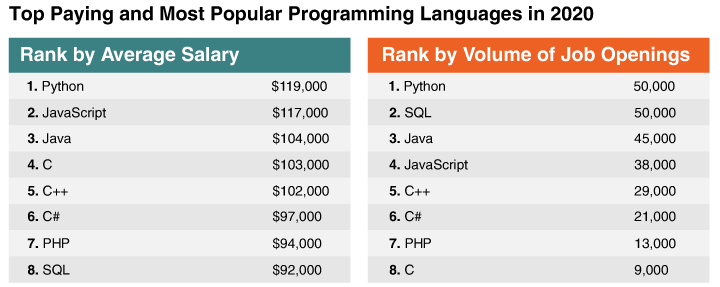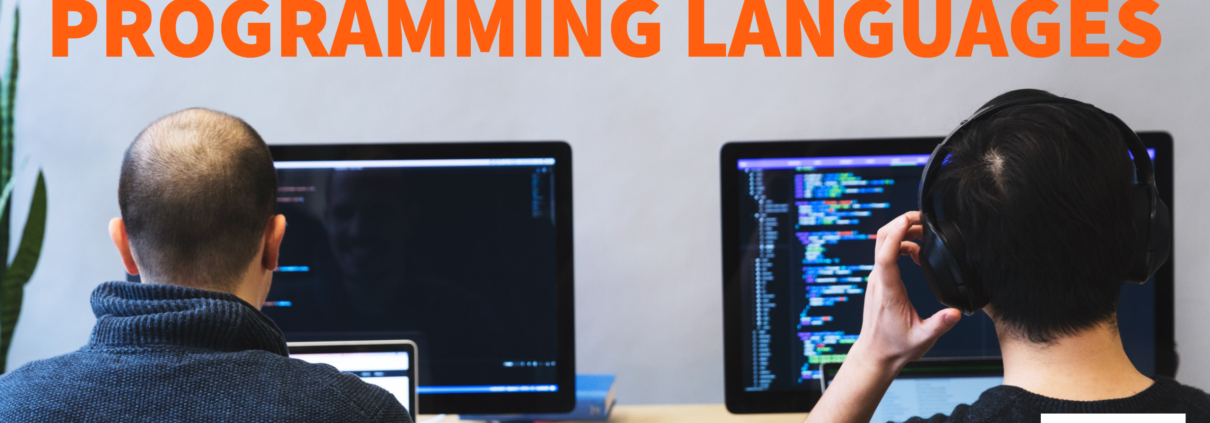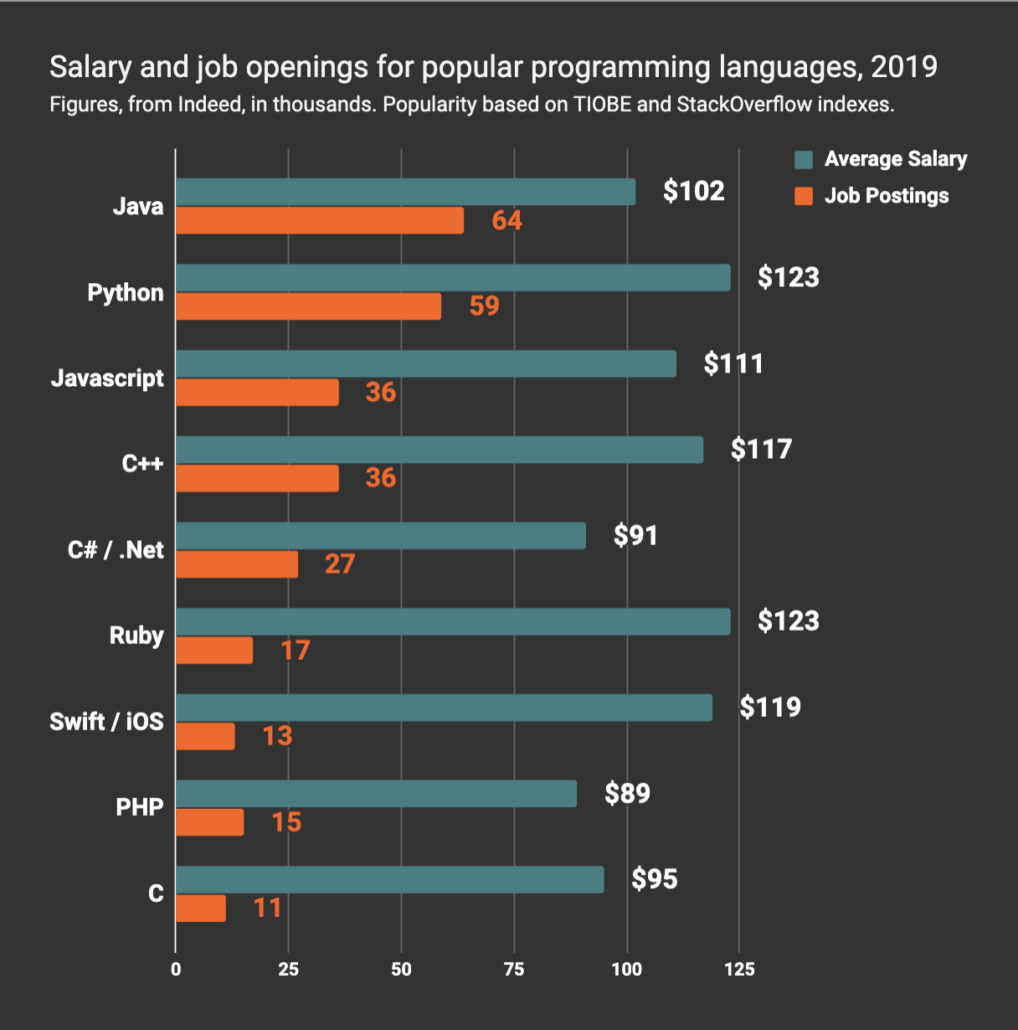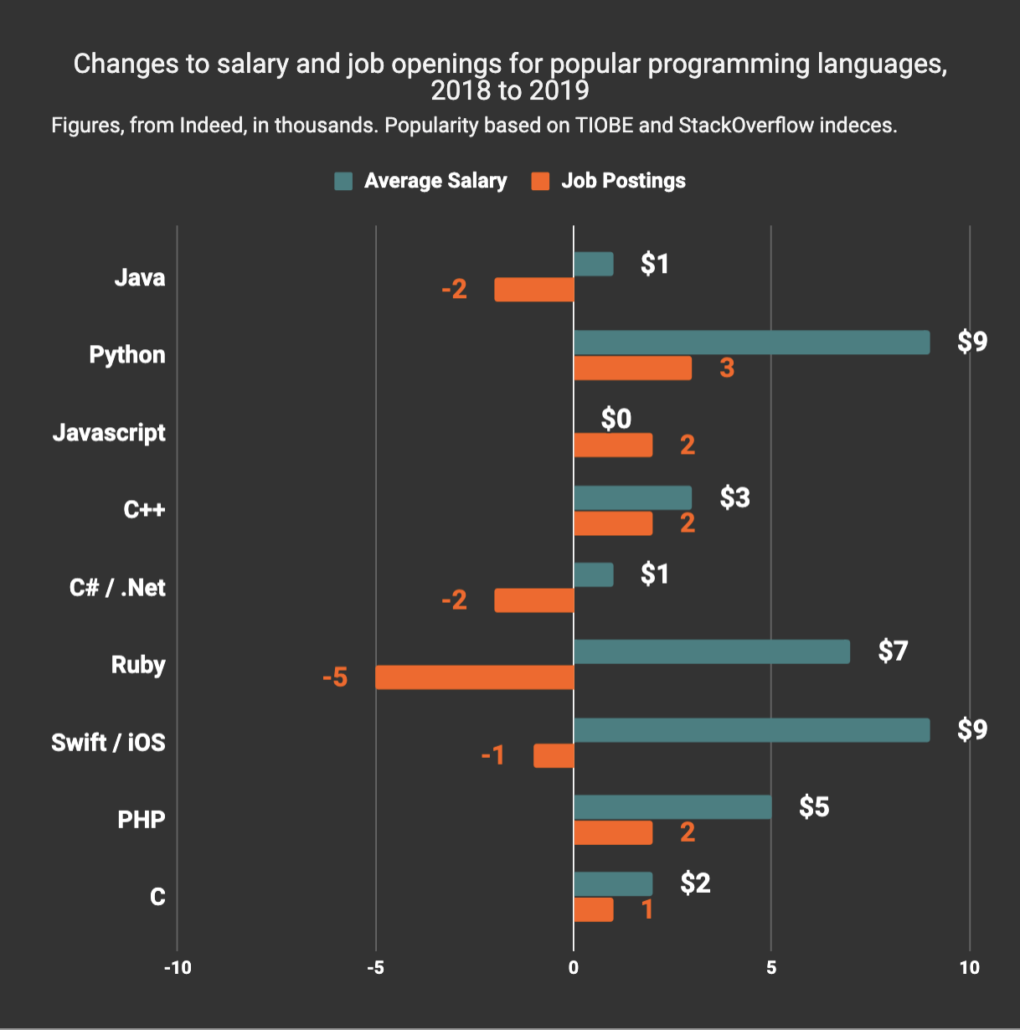The Best Paying and Most In-Demand Programming Languages in 2020
At Code Platoon, we track national demand for programming languages so that our Veterans and military spouses are trained with the best tools for a career in software development. When you’re deciding which programming language to learn, the following demand-based insights complement a much broader strategy.
We first wrote a version of this article in 2018, which can be found here.
This article attempts to answer which programming languages command the highest salaries and are most frequently targeted in job postings.
We updated the statistics for 2020, and here are our primary findings:
Python and Javascript developers continue to be in demand, commanding the highest salaries. Python in particular commands the top spot in both salary and number of open jobs. SQL developers are also widely sought after, although they get paid quite a bit less than other developers. Java saw a large drop in open jobs, and both Ruby and iOS developers have seen a similar trend.
How we identified the current top programming languages
To answer our questions, we conducted simple searches on Indeed.com, one of the largest job listing sites.
For the question of compensation, we started by searching for the top 15 most popular languages in a recent Stack Overflow survey and mapped the average salary for job listings with those languages. For demand, we tracked the number of total job postings targeting those same languages.
Ranking programming languages by pay and number of openings

Python: This coding language holds the #1 position in both surveys. Python is an interpreted, multi-purpose programming language. It is often used to build web applications and seeing exploding growth due to its use in data science, machine learning, cybersecurity, and dev ops.
Javascript: Often called ‘the language of the web,’ Javascript took #4 in Job Postings and #2 in Average Salary. Javascript is an indispensable language to know for writing web applications, as it works in the browser and on the server-side.
C++: Once a premier top-level programming language and now used primarily in gaming and high-performance applications, C++ stands at #5 in Average Salary and #5 in Job Postings. The common and useful language C++ was designed for application and systems programming. Since its creation, it’s often been used for office applications, games, and advanced graphics. C++ is very fast and stable, but difficult to learn relative to the other languages in this list (except possibly C).
Java: Integral to large-scale legacy business applications and gaining new relevance through its adoption by Google for Android, Java drops to #3 in Job Postings and #3 in Average Salary. Originally developed by Oracle, Java is extremely popular because it can be used for mobile, web, and desktop app development, and more. Reasonably stable and fast, it is very popular at the enterprise level.
C#: Similar to Java with Android, C# maintains a solid user base through its adoption in the Unity gaming engine, standing at #6 in Job Postings, and #6 in Average Salary. C# was specifically designed by Microsoft as a competitor to Java. Often used to build desktop apps and video games, as well as web apps, C# remains very popular in the enterprise. It runs on Microsoft’s .NET platform.
PHP: The language that powers WordPress, PHP is #8 in Job Postings and #8 in Average Salary. PHP is a general-purpose scripting language used for the development of web applications. One of the earliest languages for web development (released in 1995), it remains widely popular today.
C: C is one of the oldest and most widely used programming languages in the world, and holds #4 in Average Salary, and #9 in Job Postings. It is used to program everything from operating systems to hardware. What makes this language so difficult to learn is in part why it is so powerful: a lot of concepts that are hidden to users in scripting languages like Python, Ruby, and even Java are exposed in C, so that the programmer has more flexibility and complexity available.
SQL: SQL (or Structured Query Language) is the standard language for relational database management systems. It ranks #8 in Average Salary and #2 in Job Postings. SQL is not exactly a programming language, but rather it is a query language, which allows users to draw information from databases.
What will be the most popular programming language in 2020?
It’s difficult to speculate how these programming languages will fare in the future because the supply of qualified applicants affects the number of open positions. However, Python’s growth will probably continue as companies increase their adoption of data analytics tools and infrastructure software development, two areas where Python shines. Typescript, a statically typed version of Javascript continues to grow in popularity, and Go and Kotlin continues to gain fans.
If you’re looking for more information on the usefulness of various programming languages, the TIOBE Index and Stack Overflow provide two of the most authoritative reports. Both reports consider industry demand as well as additional perspectives and incorporate different approaches in determining the usefulness of programming languages.
If you’re a military Veteran or military spouse interested in learning to code, you can apply for one of our cohorts now.
Rod Levy is the Founder and Executive Director of Code Platoon. Rod spent 20+ years in finance and entrepreneurship. He was a Partner at G-Bar Limited Partners, where he co-founded and managed their volatility-arbitrage trading desk (BBR Trading) and was one of the founders of Cerrio, an internal software start-up. He holds undergraduate and Master’s degrees in engineering from Cornell University, and an MBA from The University of Chicago Booth School of Business, where he graduated with honors. Rod has also completed Dev Bootcamp’s web developer program.












